Information/Write-up
In a time of crisis, subtlety is not an option, and speed is essential. Neil Young recorded the nine original songs on this album in six days, just a month ago. He wrote four of those songs on the day he cut them. And in all nine, Young charges the current president and his administration with, among other things, lying, spying, waging war with no right or reason and dereliction of duty to the nation’s founding ideals. He then calls for the most extreme judgment available to the American people in “Let’s Impeach the President,” with rusty-fuzz guitar, the righteous muscle of a hundred-strong choir, a trumpet playing “Taps” and the self-incriminating voice of Bush himself.
Living With War is one man’s opinion: Young reports, you decide. But it is an indictment of the sorry state of open debate in this country — and its rock & roll — that the most direct, public and inspiring challenge to the Bush presidency this year has been made by a sixty-year-old Canadian-born singer-songwriter who, even at his most apoplectic, can’t resist a line like “trippin’ down the old hippie highway” (“Roger and Out”). It is also an impressive measure of Young’s refusal to burn out or fade away that he states his case with clarity as well as dirty garage-trio momentum. For me, the most damning lines in “Let’s Impeach the President” have nothing to do with Iraq and everything to do with Washington’s shameful delinquency at home: “What if Al Qaeda blew up the levees?/Would New Orleans have been safer that way/Sheltered by our government’s protection?”
Young has stuck his neck out before, not always in the expected direction (“Even Richard Nixon has got soul,” he noted in “Campaigner”). But he has not written and recorded with such emergency since “Ohio.” You can hear the haste in the sometimes odd balance of Young’s strangled tenor and the gospel army behind him. And many songs are built on mantralike repetition: Young’s chanting of “Don’t need/No more lies” in “The Restless Consumer,” the circular worry in the melody of the title song. But much of the album is set to the rhythm of Vietnam repeating itself. In “Flags of Freedom,” a young girl watches her brother march off to certain death to a chorus that echoes Bob Dylan’s “Chimes of Freedom.” And since the White House ensures that we don’t see the soaring price of Iraq — the coffins coming home — on the evening news, Young has trumpeter Tom Bray blow a bruised, elegiac solo for the dead in “Shock and Awe,” against sandstorm guitar and the harsh splash of drummer Chad Cromwell’s cymbals.
Right-wing foghorns will go to town with the fact that Young is not a U.S. citizen, even though he has lived here since the late Sixties and has three American-born children who will have to live through the consequences to come. But at the end of the album, Young lets America speak for itself, in the choir’s Sunday-prayer-meeting delivery of “America the Beautiful.” There is no irony, anger or guitars, just faith and a final warning that until we truly live up to the perfection in the final verse — “Brotherhood/From sea to shining sea” — no one has the right to say, “Mission accomplished.”
-David Fricke, Rolling Stone
Like Bruce Springsteen's We Shall Overcome: The Seeger Sessions, this album features an elder rock statesman making an effective protest record thanks to a raucously communal approach.
Four dead in O-hi-o. Southern man, when will you pay them back? A kinder, gentler machine gun hand. Like many musicians of his generation, Neil Young has never shied away from political statements. However, his views haven't always been easy to pigeonhole as left-leaning, complicated as they are by Nixon-empathy ("Campaigner"), his early-80s support for Reagan, and most recently, his ill-advised United 93 quickie tribute "Let's Roll" (not as lingeringly embarrassing as Paul McCartney's "Freedom", but a stumble nonetheless).
These mercurial politics have a lot to do with Young's impulsive nature; as his manager Elliot Roberts put it in Jimmy McDonough's biography Shakey, "If he watches TV on the road and there's a CNN special on Bosnia, Neil wants do a record and a benefit within two days." With his attention now directed toward the current Bush administration and Iraq war, that M.O. hasn't changed; in fact, the internet's greased distribution wheels have fueled it, allowing Living With War to travel from studio to stream to stores in roughly a month's time.
This fast-track approach has both advantages and drawbacks. Lyrically, Living With War captures all the indignant ferocity and off-the-cuff logic of a blog-post screed: calls for impeachment, "Mission Accomplished" mockery, etc. Obviously, Young's not dishing out well-measured, footnoted policy analysis here, but neither is he bothering with metaphor or subtlety-- it's all direct, literal, and viscerally emotional. It's a bold move: Shooting from the hip opens Young up to a whole list of easy talking-point criticisms ("oh my god, he was born in Canada!"), and the proper-name references almost guarantee a brief shelf life.
But from a musical perspective, Living With War's short gestation benefits Young's performance, inspiring him to make his loudest, rawest release of new material since at least Ragged Glory, maybe even Rust Never Sleeps. With his guitar re-tuned to its characteristic distorted snarl, and the clearly live mix preserving bum notes and sloppy harmonica or trumpet solos, Young returns to the spontaneous recording style of albums like Tonight's the Night that best suits his talents. Coming hot on the heels of the contemplative Prairie Wind, the serrated guitar of "After the Garden" and "Restless Consumer" quickly puts to rest any notion that post-aneurysm, sixty-something Neil was going to slip quietly into retirement.
The album's most effective political statement-- the decision to use a 100-strong choir for backing vocals-- has little to do with the lyrics. As unrehearsed as the main instruments, the choir is used not for pretentious ends, but as a way to turn every song into a mass protest, with Young's distinctive howl falling back into the mix behind the wall of voices on the title track or the centerpiece "Let's Impeach the President". Ironically, preaching to the choir with a choir saves Young's complaints about cable news, photo-ops, and pharmaceutical ads from succumbing to faded-hippie fogeyism.
Alongside Bruce Springsteen's We Shall Overcome: The Seeger Sessions, Living With War is the second album this spring on which an elder rock statesman makes an effective protest record with a raucously communal approach, reverently covering historically heavy anthems along the way ("America the Beautiful", in this case). As a political statement, however, Young's record may be more fleeting, with its topical references to steroids and New Orleans. But despite the press releases, the impulsive politics of Living With War are almost incidental to its success, mere fuel for Neil Young to return to the vicious sound he's neglected in recent times.
-Rob Mitchum, pitchfork, April 30, 2006
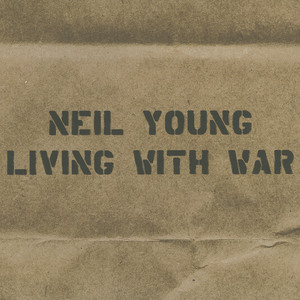
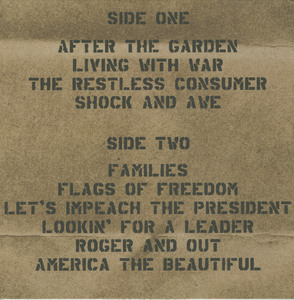
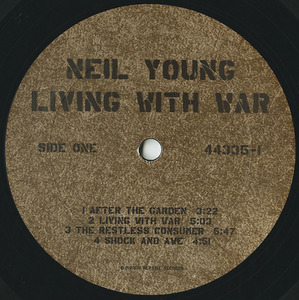
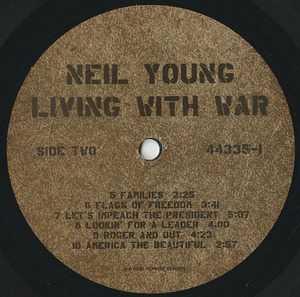
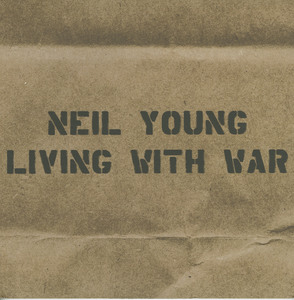
No Comments